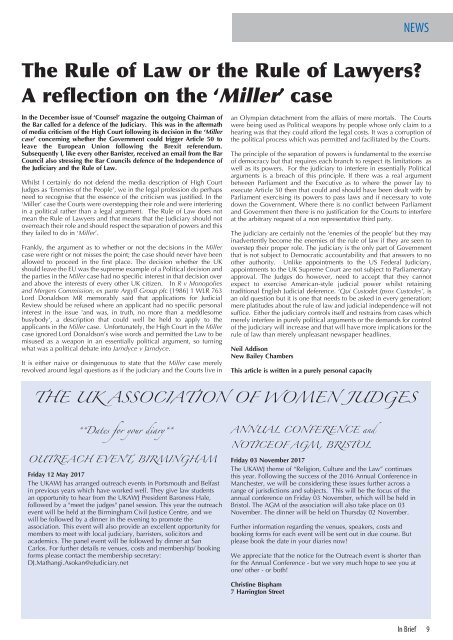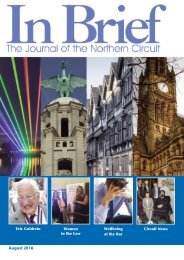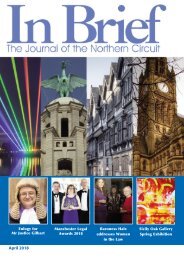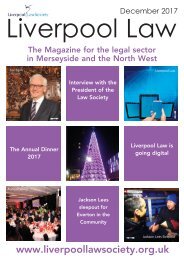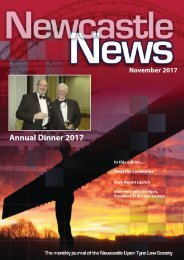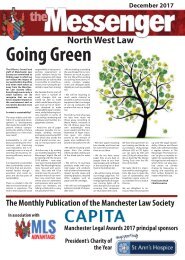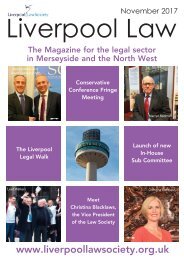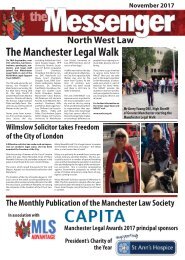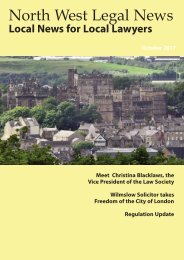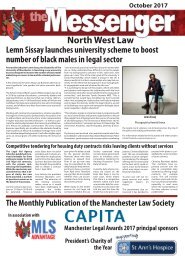IB April 2017
Create successful ePaper yourself
Turn your PDF publications into a flip-book with our unique Google optimized e-Paper software.
The Rule of Law or the Rule of Lawyers?<br />
A reflection on the ‘Miller’ case<br />
NEWS<br />
In the December issue of ‘Counsel’ magazine the outgoing Chairman of<br />
the Bar called for a defence of the Judiciary. This was in the aftermath<br />
of media criticism of the High Court following its decision in the ‘Miller<br />
case’ concerning whether the Government could trigger Article 50 to<br />
leave the European Union following the Brexit referendum.<br />
Subsequently I, like every other Barrister, received an email from the Bar<br />
Council also stressing the Bar Councils defence of the Independence of<br />
the Judiciary and the Rule of Law.<br />
Whilst I certainly do not defend the media description of High Court<br />
Judges as ‘Enemies of the People’, we in the legal profession do perhaps<br />
need to recognise that the essence of the criticism was justified. In the<br />
‘Miller’ case the Courts were overstepping their role and were interfering<br />
in a political rather than a legal argument. The Rule of Law does not<br />
mean the Rule of Lawyers and that means that the Judiciary should not<br />
overreach their role and should respect the separation of powers and this<br />
they failed to do in ‘Miller’.<br />
Frankly, the argument as to whether or not the decisions in the Miller<br />
case were right or not misses the point; the case should never have been<br />
allowed to proceed in the first place. The decision whether the UK<br />
should leave the EU was the supreme example of a Political decision and<br />
the parties in the Miller case had no specific interest in that decision over<br />
and above the interests of every other UK citizen. In R v Monopolies<br />
and Mergers Commission, ex parte Argyll Group plc [1986] 1 WLR 763<br />
Lord Donaldson MR memorably said that applications for Judicial<br />
Review should be refused where an applicant had no specific personal<br />
interest in the issue 'and was, in truth, no more than a meddlesome<br />
busybody', a description that could well be held to apply to the<br />
applicants in the Miller case. Unfortunately, the High Court in the Miller<br />
case ignored Lord Donaldson’s wise words and permitted the Law to be<br />
misused as a weapon in an essentially political argument, so turning<br />
what was a political debate into Jarndyce v Jarndyce.<br />
It is either naive or disingenuous to state that the Miller case merely<br />
revolved around legal questions as if the judiciary and the Courts live in<br />
an Olympian detachment from the affairs of mere mortals. The Courts<br />
were being used as Political weapons by people whose only claim to a<br />
hearing was that they could afford the legal costs. It was a corruption of<br />
the political process which was permitted and facilitated by the Courts.<br />
The principle of the separation of powers is fundamental to the exercise<br />
of democracy but that requires each branch to respect its limitations as<br />
well as its powers. For the judiciary to interfere in essentially Political<br />
arguments is a breach of this principle. If there was a real argument<br />
between Parliament and the Executive as to where the power lay to<br />
execute Article 50 then that could and should have been dealt with by<br />
Parliament exercising its powers to pass laws and if necessary to vote<br />
down the Government. Where there is no conflict between Parliament<br />
and Government then there is no justification for the Courts to interfere<br />
at the arbitrary request of a non representative third party.<br />
The judiciary are certainly not the ‘enemies of the people’ but they may<br />
inadvertently become the enemies of the rule of law if they are seen to<br />
overstep their proper role. The judiciary is the only part of Government<br />
that is not subject to Democratic accountability and that answers to no<br />
other authority. Unlike appointments to the US Federal Judiciary,<br />
appointments to the UK Supreme Court are not subject to Parliamentary<br />
approval. The Judges do however, need to accept that they cannot<br />
expect to exercise American-style judicial power whilst retaining<br />
traditional English Judicial deference. ‘Qui Custodet Ipsos Custodes’, is<br />
an old question but it is one that needs to be asked in every generation;<br />
mere platitudes about the rule of law and judicial independence will not<br />
suffice. Either the judiciary controls itself and restrains from cases which<br />
merely interfere in purely political arguments or the demands for control<br />
of the judiciary will increase and that will have more implications for the<br />
rule of law than merely unpleasant newspaper headlines.<br />
Neil Addison<br />
New Bailey Chambers<br />
This article is written in a purely personal capacity<br />
THE UK ASSOCIATION OF WOMEN JUDGES<br />
**Dates for your diary**<br />
ANNUAL CONFERENCE and<br />
NOTICEOF AGM, BRISTOL<br />
OUTREACH EVENT, BIRMINGHAM<br />
Friday 12 May <strong>2017</strong><br />
The UKAWJ has arranged outreach events in Portsmouth and Belfast<br />
in previous years which have worked well. They give law students<br />
an opportunity to hear from the UKAWJ President Baroness Hale,<br />
followed by a "meet the judges" panel session. This year the outreach<br />
event will be held at the Birmingham Civil Justice Centre, and we<br />
will be followed by a dinner in the evening to promote the<br />
association. This event will also provide an excellent opportunity for<br />
members to meet with local judiciary, barristers, solicitors and<br />
academics. The panel event will be followed by dinner at San<br />
Carlos. For further details re venues, costs and membership/ booking<br />
forms please contact the membership secretary:<br />
DJ.Mathangi.Asokan@eJudiciary.net<br />
Friday 03 November <strong>2017</strong><br />
The UKAWJ theme of “Religion, Culture and the Law” continues<br />
this year. Following the success of the 2016 Annual Conference in<br />
Manchester, we will be considering these issues further across a<br />
range of jurisdictions and subjects. This will be the focus of the<br />
annual conference on Friday 03 November, which will be held in<br />
Bristol. The AGM of the association will also take place on 03<br />
November. The dinner will be held on Thursday 02 November.<br />
Further information regarding the venues, speakers, costs and<br />
booking forms for each event will be sent out in due course. But<br />
please book the date in your diaries now!<br />
We appreciate that the notice for the Outreach event is shorter than<br />
for the Annual Conference - but we very much hope to see you at<br />
one/ other - or both!<br />
Christine Bispham<br />
7 Harrington Street<br />
In Brief 9


